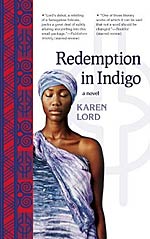
![]() charlesdee
charlesdee
5/23/2012
![]()
I am inclined to quote extensively from Lord's novel in this review. Her opening paragraph establishes a voice that will do a great sorting out of her potential readers.
A rival of mine once complained that my stories begin awkwardly and end untidily. I am willing to admit to many faults, but I will not burden my conscious with that one. All my tales are true, drawn from life, and a life story is not a tidy thing. It is a half-tamed horse that you seize on the run and ride with knees and teeth clenched, and then you regretfully slip off as gently and safely as you can, always wondering if you could have gone a few metres more.
Thus I seize this tale, starting with a hot afternoon in the town or Erria...
Her narrator speaks to the reader with the omniscience and wit of Henry Fielding translated into the imagery and diction of a oral teller of folk tales. And notice that the complaint has come from a "rival" and not a "friend." The narrator who is willing to jump onto a half-trained horse does not hesitate to defend her position, and she states absolutely that all her tales are drawn from life before embarking on a story that will involve talking spiders, tricksters, psychic communication, and djombi, undying beings that mess constantly, for good or ill, in the concerns of humans.
That first talking spider could be the next challenge for many readers. I am no fan of full blown magic realism, novels hundreds of pages long with butterflies flocking from a character's ears or tropical snowfalls following the death of someone's great grandmother. (I think I concocted both those incidents on the spot here.) But Lord's short novel stays true to the spirit of folk tales where spider's absolutely hang out in bars and contract with shady characters for less than reputable services. Where a band of dissident djombi pass the Chaos Stick onto Paama, Lord's heroine who is a runaway wife, excellent cook, and brave but never foolishly so.
Lord lives in Barbados, but she bases the early scenes of her novel on a Sengalese folk tale, and the geography throughout the book is more African than Caribbean in scale. Paama has left her absurd, gluttonous husband Asinge and returned to her parents house. After two years Ansige follows her, craving her cooking which is the only thing that comes close to satisfying his abnormal appetite. When most of his servants, disgusted by his childish and distasteful habits, abandon him, he unfortunately enlists the aid of a trickster who will see to it that all his behavior in his wife's family's village will humiliate him and shame him back to his home.
This preamble is a way of certain djombi to study Paama's behavior and decide that she is in fact worthy of maintaining the Chaos Stick they have stolen from the indigo lord who has controlled it for -- well, it's hard to say for how long when dealing with eternal beings who also time travel. The indigo lord, disguised as a traveling merchant, finds Paama and her family and at the end of an elaborate dinner carries her into his world, which is her world minus the boundaries of space and time. The indigo lord is a magnificent creation. He is arrogant and seductive, apparently unfazed by the fate of lovers in plague-stricken city and dryly witty about a marauding army destroyed by a flood after an unprovoked attack on a innocent city. Surveying the carnage, he says, "I might have gotten a little carried away." He is angered and hurt that the Chaos Stick, his reason for existing, has been taken from him. I am not clear on how irresponsibly he might have wielded it but he is clearly devastated and also outraged that he cannot simply snatch it back. Getting it back will entail negotiations with Paama, who is neither a fool nor a coward. There are lessons to be learned on both sides, and the narrator states at one point that she is opposed to those who think stories should not have morals.
This is a story about the responsible use of power even given the overwhelming influence of chance of human life -- a big theme that fits neatly within this 200 page tale as it ever could in a political novel several times the length. While Lord's characters, both undying and human, learn to question every aspect of their realities, she is confidently riding her half-trained horse, never losing the track of her story while keeping an eye on her readers. In one scene a character talks to a village storyteller about his profession. His answer could be Lord once again stating her goals and narrative technique.
"I am a storyteller. I travel to collect stories, and I return to tell the stories of one place to the people of another. That is the important part of the trade. You must never tell people their own stories. They have no interest in them, or they think they can tell them better themselves. Give them a stranger's life, and they are content."
http://www.potatoweather.blogspot.com